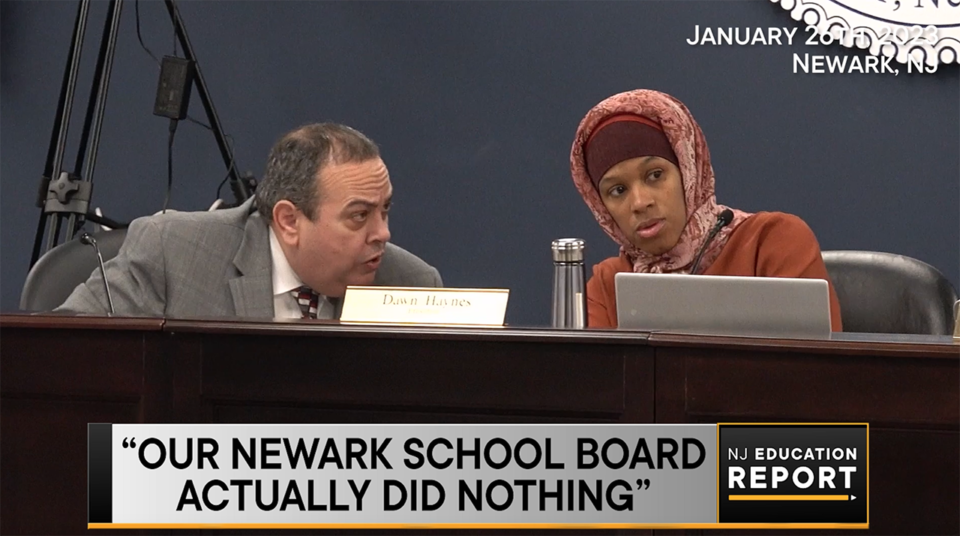
How Often Does a Senate Committee Meeting Remind You of a Trump-Biden Debate?
December 7, 2020
Senate Education Committee Demands a "Reckoning With Truth," Despite Pleas From NJEA
December 8, 2020Why Should the State Ed. Dept. Have to Collect Data on Student Learning Loss? Here’s Why.
This is testimony from JerseyCAN Executive Director Patricia Morgan, given yesterday at the Senate Education Committee’s hearing on Bill S3214. The bill mandates that Commissioner Angelica Allen-McMillen “require each school district to submit data on student academic outcomes within 30 days of the effective date of this act. The data shall be used by the commissioner to develop a learning loss report that identifies and quantifies the impact of the COVID-19 public health emergency on student outcomes.”
The Senate Education Committee voted to advance the bill to the full Senate. Committee Chair Teresa Ruiz remarked, “Hopefully, this bill doesn’t get to the Senate floor because DOE will take action of its own.”
Here is Morgan’s testimony:
December 7, 2020
Dear Chairwoman Ruiz and the Senate Education Committee Members,
JerseyCAN, the New Jersey Campaign for Achievement Now, supports S3214. JerseyCAN is a nonprofit organization that launched in March of 2013, and we advocate for a high-quality education for all New Jersey kids, regardless of their address. Senate Bill No. S3214 will provide the necessary transparency and data to understand the impact COVID-19 has had on our student’s academic outcomes. This pandemic has made three things abundantly clear:
I. Statewide transparency on student learning must be a priority
There has absolutely been deep learning loss, not just a delay in learning, due to COVID-19 and the inconsistent delivery of education across the state. We know there is learning loss because there were achievement and opportunity gaps pre-pandemic. For New Jersey, there has been little information on the academic impact of spring closures and fall reopening learning models. Only one national study from CREDO tried to share state specific estimates of learning loss from the spring. This is what they found:
● For reading, New Jersey students might have experienced anywhere from 174 days of learning lost in reading to some marginal gains (less than 58 days).
● For math, New Jersey students might have experienced learning losses as large as 464 days or as small as less than 58 days.
National predictions on the impact of school closures on student learning has been released by the Collaborative for Student Growth. They predicted that in reading, the largest losses would be in grade 3 and in math the largest learning loss would be in grade 3, 4 and 5. A new fall report from that group found loss may not be that large, but more alarmingly found students are missing.
● “Some differences by racial/ethnic groups are emerging in the fall 2020 data, but it is too early to draw definitive conclusions from these initial results. Student groups especially vulnerable to the impacts of the pandemic were more likely to be missing from our data. Thus, we have an incomplete understanding of how achievement this fall may differ across student groups and may be underestimating the impacts of COVID-19.”
Parents want to know how their students are doing now and with respect to where they should be. JerseyCAN, and partners, collected the first statewide data this fall through a parent poll. Our statewide parent poll found that 96% of all parents want regular access to their child’s teachers. However, only 50% of all parents say that their child’s school is doing this. Additionally, 97% of all parents say it would be helpful to have regular live access to their teacher, but only 57% say their child’s school is doing this. And 95% want information about whether their child is on grade level, but only 26% of parents say they are getting this. This is unacceptable for any state, let alone New Jersey, the nation’s leader.
II. Black and brown students and families have had to bear the brunt of this pandemic
According to a recent report from McKinsey, these academic, social and emotional gaps will have long-term socio-economic impacts on students. Their data estimates that the average K-12 student in the U.S. will lose $61,000 to $82,000 in lifetime earnings due to the learning gaps exacerbated COVID-19. These estimates are worse for Black and Hispanic students. Given these initial projections and a second wave of the pandemic now hitting New Jersey, JerseyCAN is highly concerned about widening achievement and opportunity gaps, and the long-term impact of COVID-19 on students’ life outcomes. Many districts serving the most vulnerable students and families have remained completely virtual. Furthermore, our statewide parent poll also found that parents believe their student’s academic needs have not been met: 47% of New Jersey families believe their child will need a lot of additional support to have a successful school year, with an additional 26% of all parents saying their child will need some additional support.
● The need is most concentrated among low-income parents of color with 54% percent of low-income Black parents and 56% of low-income Latinx parents stating they need a lot ofadditional support (compared to higher income parents, 45%).
● Low-income parents overall (51%) say they need a lot of additional support. Low-income parents are also less likely to be supplementing their child’s education with educational sources outside public school option.
Due to the lack of statewide data, New Jersey has no direction. Without the data from this bill, our most vulnerable students will continue to be missing from the focus and conversations at the state-level. Without the data from Bill S3214, smart policy solutions like intensive tutoring, immersive summer programming, extended school days are impossible to implement.
III. New Jersey’s education system must become more agile.
New Jersey’s system, even though it has been lauded as number one nationwide, was not prepared orable to pivot to meet the needs of all students during a pandemic. School closures have exacerbated the pre-existing achievement and opportunity gaps. We do not know the extent of this learning loss and that is the most critical question if we are going to remedy it. Statewide, 52% of parents say they have at least one child that is participating in remote learning full-time, while 70% percent of Black parents, 61% of Latinx parents, and 72% of low-income families say that their child is remote learning full-time. Low-income parents (56%) and parents of color are also less likely to report having the option of hybrid learning, when compared to their white (76%) or more affluent peers (73%) This pandemic showed the truth behind New Jersey’s public education system — there has been one approach for more affluent students and another one for low-income students. Without Bill S3214, these two separate systems will continue to operate unchecked and students will be the ultimate loser. New Jersey must learn from the spring and respond this fall by restabilizing our education system with data in order to address the learning loss statewide. Then, as a state, we must prepare for future disruptions and ensure that no New Jersey student is forgotten or deprived of an academic future.
IV. Conclusion
Chairwoman Ruiz has been a truth teller on behalf of our students and this legislation is another step about helping meet their needs in the midst of a pandemic that has upended our society with particular severity for our most vulnerable minority communities.
Sincerely yours,
Patricia Morgan
Executive Director
JerseyCAN




